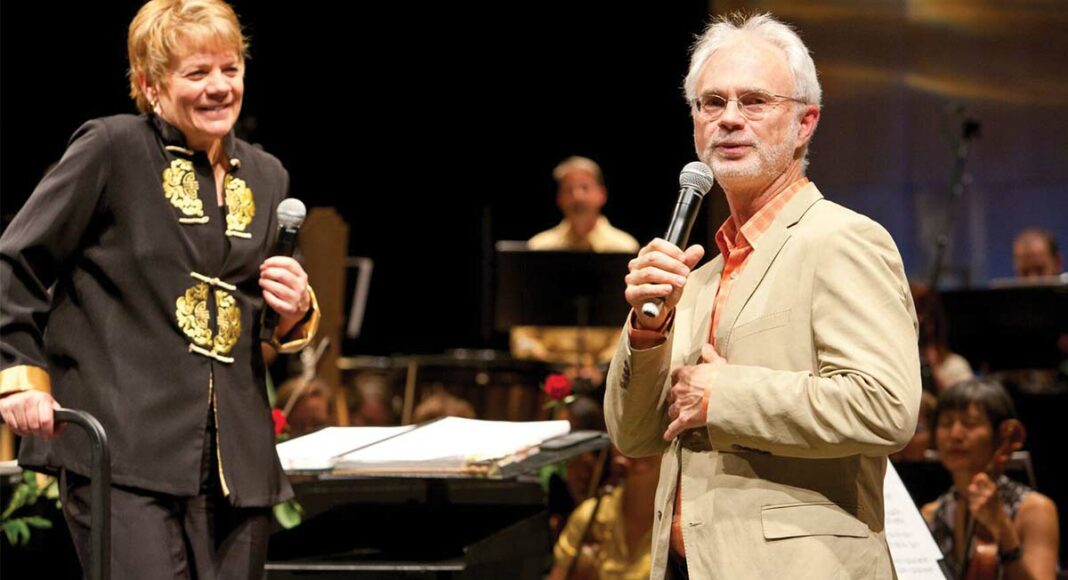Next week, Santa Cruz will host the world premiere of a work by American composer John Adams, commissioned by the Cabrillo Festival Orchestra in honor of Marin Alsop, and it’s serendipitous for many reasons. One of them is that Adams, a Pulitzer-prize-winning composer of opera and symphonic works, was himself the interim artistic director of the Festival in 1991, during the period between a Dennis Russell Davies sabbatical and the hiring of Alsop as director for her unprecedented 25-year tenure.
A frequent contributor to and featured artist of the Festival, Adams and his wife Deborah O’Grady established in 2011 an invitational competition for young composers to create short musical pieces. Those selected each year add to the rich texture and youthful energy of the innovative annual program. Many a career has thus been launched.
This year Adams was commissioned to create a tribute and musical farewell to the outgoing artistic director. And the ridiculously busy composer just happened to have an idea-in-progress up his sleeve. On Aug. 6—the second evening of this year’s Festival—audiences will be treated to an orchestral piece excerpted from a larger work, an opera about the California gold rush Adams is in the throes of creating with his frequent colleague Peter Sellars (Doctor Atomic).
The new work represents a moment in Adams’ larger work in progress called The Girls of the Golden West, partly inspired by Puccini’s opera Girl of the Golden West (La fanciulla del West).
“Peter Sellars wanted to do an update of that opera,” Adams says. “He had been asked to do the Puccini opera thinking that the libretto was very dated. I read the libretto for the Puccini and found out that the librettist [Guelfo Civinini, working from a play by American David Belasco] actually did spend time in California.” The Puccini opera premiered in New York in 1910. “But we’re looking at the story with modern eyes,” Adams promises.
As he thought about what he might create in honor of Marin Alsop, Adams found something close at home. “There is an orchestral portion—a dance for Lola Montez—within the opera I am working on,” he says. “The idea was sparked by a San Francisco newspaper from the 1880s, where we found a histrionic description of her rather fabulous spider dance.”
Adams reminded me that Montez was a celebrated and controversial fixture of courts, saloons, and theaters the world over in the mid-19th century. “She was the mistress of King Ludwig I of Bavaria, who made her a countess,” he says. The Irish-born Montez also had an affair with Franz Liszt (among others) before she fled Europe for the wild frontier of the California gold rush. Here she developed her daring spider dance which she flaunted in the gold fields of Australia as well. Montez was a girl of two golden Wests, as it turns out.
Adams, who confessed he hadn’t yet written the music for Montez’ dance, has used the occasion of the Alsop commission to “jump ahead in the opera and write this section. It’s a stand-alone piece for Marin and I expect she will perform it elsewhere in the future.”
Montez was only one of the “girls of the golden west” Adams and Sellars describe in the upcoming opera. Few women ventured into the 1850s gold fields, but Adams found two extraordinary stories.
“I have a little cabin in the high Sierras near Downeyville, and there was a famous event that happened there,” Adams says. “A young Mexican woman was working in a bar and was harassed by a miner. She stabbed him to death. Apparently there was a quick trial and within 24 hours the town had hanged her. We wove a lot of stories around her,” he reveals. “And the other woman was Louise Smith Clappe, who wrote for a local newspaper under the name Dame Shirley. She spent 18 months in crude mining camps, and she wrote letters, called the Shirley letters, that I consider an outstanding example of 19th-century American literature,” he says. Clappe and her physician husband had come to the West for the mountain climate, and the writer mined her personal experience of the gritty ambience of the rough mining camps during the 1850s height of gold fever. “We’ve created scenes around those letters,” Adams adds, tantalizingly.
“The opera will premiere in 2017, the year of my 70th birthday,” he says. “San Francisco Opera seemed the right place to premiere it, given the history behind the opera.” Will there be more operas from the composer of The Death of Klinghoffer? “More opera?” Adams laughs. “I’ve been working on this opera daily for almost two years, and I’ve just begun orchestrating the second act. It’s a lot of work.”
A sneak preview of Adams’ next opera can be heard on Aug. 6, as the composer’s gift to outgoing conductor Alsop.
Edit 7/27/16 11:00am: Opera incorrectly attributed to John Adams was removed.














